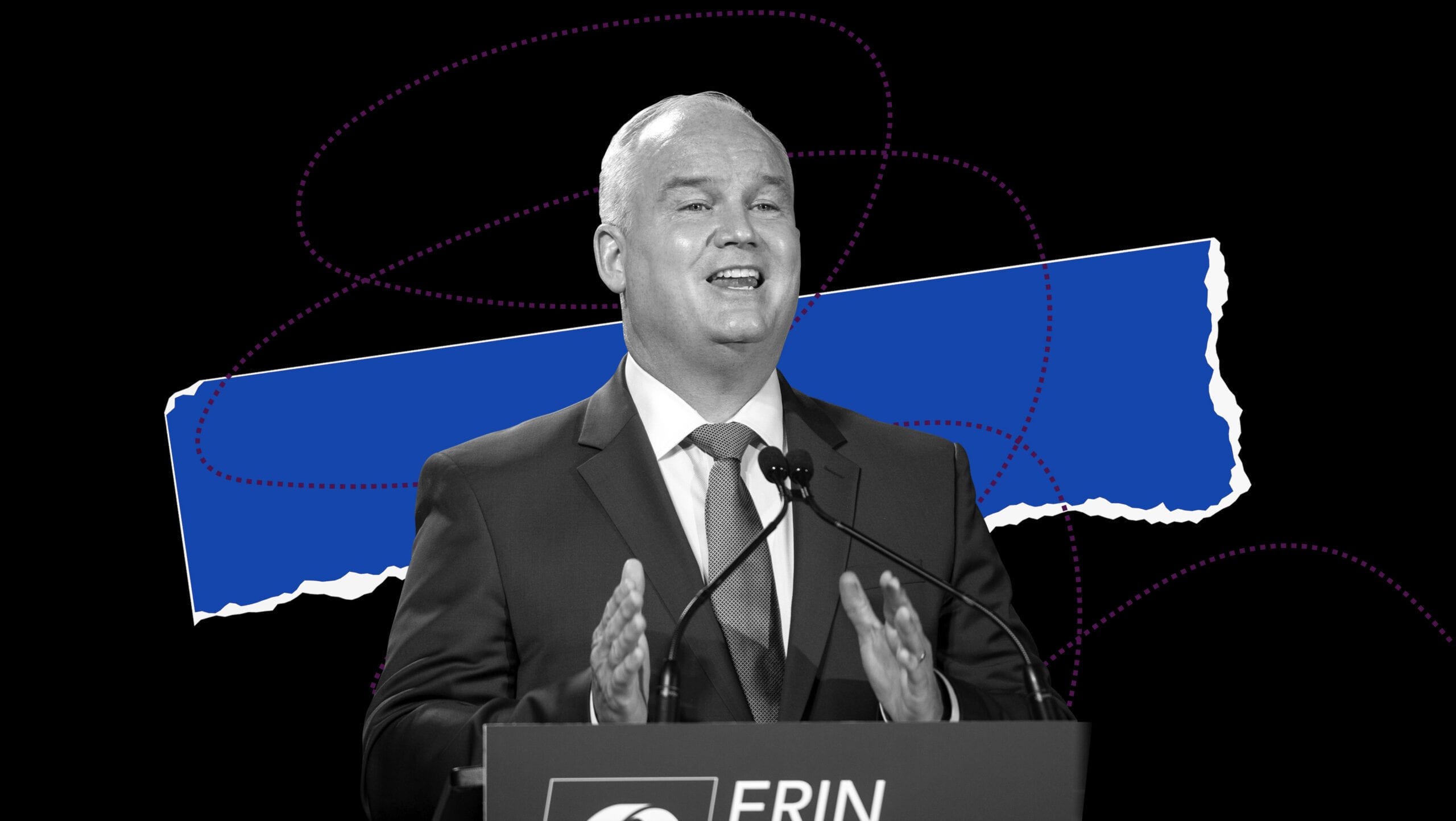After an unprecedented leadership race—forced online by the COVID-19 pandemic and marred by delays due to technical glitches—Erin O’Toole emerged Sunday night as the new leader of the Conservative Party of Canada. Now Leader of the Official Opposition, O’Toole is tasked with holding a Liberal minority government to account, all the while moving the Conservative Party in a new, more unified direction.
That new direction could mean addressing the party’s inclusion of LGBTQ2 people. Last year, former leader Andrew Scheer stumbled through a federal election campaign after failing to walk back anti-gay comments he made in the House early in his career, and many Conservative commentators say it contributed to his inability to win the election. That led each of the four leadership hopefuls to take marked, public stances on LGBTQ2 issues throughout the race.
As O’Toole takes the helm, here’s everything LGBTQ2 people should know about his position on LGBTQ2 issues—from campaign promises to past actions.
His first order of business: Calling for a more inclusive Conservative Party
In his victory speech, O’Toole put an emphasis on party unity and broadening the party’s supporters. In particular, the 47-year-old Durham, Ontario MP focused on the inclusion of marginalized communities often considered outliers in the Conservative Party.
“I believe that whether you are Black, white, brown or from any race or creed, whether you are LGBT or straight, whether you are an Indigenous Canadian or have joined the Canadian family three weeks ago or three generations ago… you are an important part of Canada and you have a home in the Conservative Party of Canada,” he said.
He will march in Pride—but only if cops can, too
At the start of the Conservative leadership race, frontrunner and former Cabinet minister Peter MacKay announced he was running—and, in an effort to distinguish himself from Scheer, noted that he would march in Toronto Pride, then slated one day after the Conservative convention. “Pride parades are important,” MacKay wrote.
O’Toole took that stance one step further: He too would march in Pride—a first for a sitting Conservative leader—but only if uniformed police could, too. In a tweet titled “Inclusive Pride parades are important,” O’Toole wrote: “When Toronto Pride becomes a truly inclusive event, I will march in that with my uniformed friends.”
Inclusive Pride parades are important. pic.twitter.com/0tpGjpglYQ
— Erin O’Toole (@ErinOTooleMP) January 28, 2020
Marching in uniform is a personal matter for O’Toole: He was a member of the Royal Canadian Air Force, flew the Sea King helicopter in support of the Royal Canadian Navy, and he served as Stephen Harper’s Minister of Veteran Affairs in 2015.
He supports gay marriage
Early on in the leadership race, candidate Richard Décarie appeared on CTV’s Power Play and told host Evan Solomon that he believed being gay was a choice. That statement eventually saw Décarie thrown from the race—but not before it provided an opportunity for other leadership hopefuls to distinguish themselves from former leader Scheer on the issue of gay marriage.
This statement is ridiculous. The Conservative Party of Canada is open to ALL Canadians. Our membership made it clear when we voted to recognize same-sex marriage. https://t.co/f6pYCtyXGJ
— Erin O’Toole (@ErinOTooleMP) January 23, 2020
“This statement is ridiculous,” O’Toole tweeted. “The Conservative Party of Canada is open to all Canadians. Our membership made it clear when we voted to recognize same-sex marriage”—referring to the party’s 2016 vote to broaden the definition of marriage beyond a union between a man and a woman.
And though O’Toole was second-choice among many social conservative voters, he says supports gay marriage.
He supported an early bill protecting trans rights—but not Bill C-16
In April, O’Toole was called out in an email blast from competitor Peter MacKay for having voted in favour of Bill C-279, which he pejoratively called a “bathroom bill.” That legislation was tabled by openly gay NDP MP Randall Garrison in 2012, seeking protections for trans and non-binary folks against discrimination on the basis of gender identity. O’Toole was one of just 18 Conservative MPs to support the bill.
“I am proud of my voting record,” O’Toole told CBC on the matter. “It demonstrates my principled Conservative position of defending the rights of all Canadians, including LGBTQ rights.”
Bill C-279 eventually died, but the Liberal government later passed similar legislation in 2017. Bill C-16 would add protections on the basis of gender identity and gender expression to the Canadian Human Rights Act and the Criminal Code. O’Toole, however, abstained from the vote on that bill.
His stance on a conversion therapy ban is wishy-washy
During a virtual campaign meeting with Quebec social conservatives in June, O’Toole raised concerns about Bill C-8, tabled by the Liberal government to ban conversion therapy on a national scale. “It’s very important to respect the conversation between a priest and the members of their flock,” he said during the meeting, alluding to the practice of conversion therapy that occurs among religious groups attempting to “change” a person’s sexual orientation or gender identity.
O’Toole’s campaign later walked back that statement, noting that his concerns were not with the ban but how the legislation had been drafted. “Coercive, degrading actions that seek to change a person’s sexual orientation or gender identity should be banned,” his campaign told CBC.
Bill C-8 has now died, after Prime Minister Justin Trudeau prorogued Parliament last week. The bill can only be revived with unanimous consent from the House of Commons.
Legacy: August 24, 2020 3:20 pmThis story has been updated to more accurately reflect Erin O’Toole’s military career.


 Why you can trust Xtra
Why you can trust Xtra


